That Cancer Conversation
All Episodes
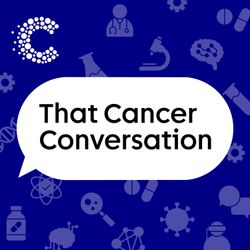
4. Can a blood test identify cancer?
48:41||Season 4, Ep. 4What if our blood could help us detect cancer earlier than ever before? In this episode, we’re exploring liquid biopsies, cutting-edge blood tests that can pick up the smallest signs of cancer swirling through the blood. We sit down with Professor Nitzan Rosenfeld, Director of Barts Cancer Institute and a pioneer in the field. Professor Rosenfeld explains how fragments of tumour DNA enter our blood from cancer cells, what they can tell us about cancer, and how liquid biopsies can use blood samples to transform early detection, screening and treatment. Don't forget to like, subscribe and hit that notification bell to hear about new episodes!--------In this episode, you’ll learn: The ways tiny molecular hints about our health can end up in our blood How circulating tumour DNA (ctDNA) in the blood can help us detect and understand tumours in other parts of the body, giving a fuller picture than traditional biopsies and scans The different types of liquid biopsies that can be used to diagnose cancer, guide personalised treatment, check if any traces of cancer remain after therapy (called MRD, or minimal residual disease) and track changes as tumours evolve What the NHS GALLERI trial, which uses a single blood test to screen more than 50 cancer types in people without symptoms, could mean for early cancer detection What our blood might reveal about our future health, and how that might change the way we thinkProfessor Nitzan Rosenfeld is the Director of Barts Cancer Institute at Queen Mary University of London (QMUL), which is a key part of the Cancer Research UK City of London Centre. He’s also Professor of Applied Cancer Research at QMUL and the head of a lab that develops liquid biopsies for detecting and monitoring cancer.------If you enjoyed today’s episode and want to find out more, you can check out our liquid biopsies articles on the Cancer News site: https://news.cancerresearchuk.org/topic/liquid-biopsies/ We also have an immersive guide to the array of cancer clues that tests can find floating in blood: https://news.cancerresearchuk.org/shorthand_story/what-are-liquid-biopsies/ You can read more about the NHS-Galleri trial on the NHS website: https://www.nhs-galleri.org/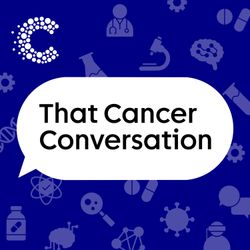
3. What do weight loss drugs mean for cancer?
39:18||Season 4, Ep. 3Welcome back to That Cancer Conversation! Drugs like Mounjaro and Wegovy are helping millions of people across the UK lose weight faster and more effectively. That’s important for us, because obesity is one of the leading preventable causes of cancer. So, with obesity and cancer on the rise around the world, could weight loss drugs be a way for us to tackle them both together? To help break down the science of weight loss injections and how they work, we’re joined by Dr Rachel Orritt, one of our health information managers at Cancer Research UK. We also speak to Dr Matthew Harris, a surgeon and Cancer Research UK Clinical Research Fellow, about how he and his fellow researchers are working to answer the long list of questions we still have about weight loss drugs and cancer. -------Discussed on today’s episode: Weight loss drugs and cancer: what we know so farPADRAIC project Causes of cancer and reducing your risk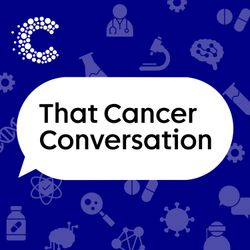
2. Could AI help us beat cancer?
34:53||Season 4, Ep. 2Welcome back to That Cancer Conversation! Artificial Intelligence is no longer science fiction. It's here and it's becoming part of our everyday lives. But what happens when AI steps into the world of healthcare? Could it actually help us beat cancer? In this episode we’re joined by Lara Lewington, a technology journalist and author of the bestselling book, Hacking Humanity: How technology can save your health and your life. Lara explains how AI is shaping the healthcare of tomorrow and how it could change the way we prevent, diagnose and treat cancer. We’re also joined by Professor Peter Coveney, from University College London. He discusses his work on digital twins - a virtual version of you that could help make real-life healthcare smarter and safer. We discuss the risks and benefits of AI and ask one of the biggest questions: could AI ever replace doctors? --------------------- Discussed on today's episode: AI could improve cancer diagnosis – if we get these 5 things right Digital twins and Big AI: the future of truly individualised healthcare --------------------- For more cancer stories, visit Cancer News ---------------------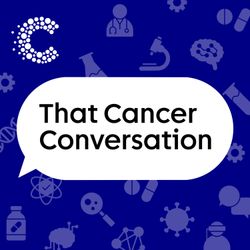
1. Can exercise help treat cancer?
34:06||Season 4, Ep. 1Welcome to series 4 of That Cancer Conversation! We kick off the first episode of the new series discussing the power of exercise. We all know exercise is good for our health. It can make a huge difference to our overall wellbeing and recovery, but could it go even further? Could it help us survive cancer? In this episode we’re first joined by Kara Miller, a former professional netball player who was diagnosed with bowel cancer back in 2022. She reflects on her athletic career and how it helped her not only through cancer treatment but also inspired her to become a cancer rehabilitation personal trainer. We also hear from Professor Vicky Coyle, a researcher at Queen’s University Belfast who led the UK arm of the CHALLENGE trial, investigating whether exercise could help people survive bowel cancer. She shares the incredible results of her research and what this could mean for the future of cancer treatment and care. If you enjoyed the episode, don’t forget to subscribe and watch it all on our YouTube channel! ----------------------------Discussed on today's episode:Exercise can help more people survive colon cancer What are the benefits of exercise? CHALLENGE trial paper ----------------------------For more cancer stories, visit Cancer News----------------------------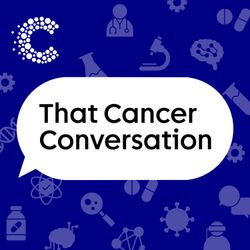
8. What happens when royalty get cancer?
54:20||Season 3, Ep. 8Welcome to another episode of That Cancer Conversation! For our series finale, Sophie is joined by royal correspondent and best-selling author, Katie Nicholl. Katie has spent over 20 years writing about the British royal family, from A-levels to coronations, Katie has reported it all. But when King Charles III and Princess Catherine both announced their cancer diagnoses, their stories hit very close to home, as only a few months earlier Katie finished her own treatment for liver cancer.On this episode, Katie talks to Sophie about her own personal cancer story, being diagnosed with a rare form of liver cancer (cholangiocarcinoma), and reflects on the impact the King and Princess of Wales have made from their own cancer experiences. You can watch the full episode on our YouTube channel! We’ll be back soon with series 4! Thank you for tuning in and subscribe to be the first to listen to new episodes. Links: Read more about cholangiocarcinoma AMMF The Cholangiocarcinoma Charity Follow Katie on Instagram Discover more of Katie’s work: Vanity Fair DYNASTY podcast: The Royal Family’s Most Challenging Year For more cancer stories, visit Cancer News.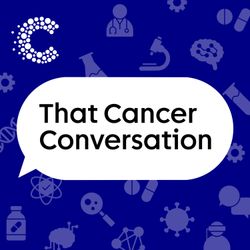
7. What is radiotherapy?
57:53||Season 3, Ep. 7Welcome to another episode of That Cancer Conversation!Here in the UK, radiotherapy plays a part in treating more than 140,000 people with cancer every year. From infants to adults, radiotherapy is a precise and personalised tool used to target many different types of cancer.But how does it all work?In this episode Sophie speaks to Hayley Brown, a science engagement manager at Cancer Research UK to explain alongside breaking down the history and evolution of radiotherapy. Sophie also speaks to Nevo, a image consultant and stylist who was diagnosed with breast cancer in 2012 and underwent radiotherapy as part of her cancer treatment. She explains what is was like and why she believes it's important to keep having a conversation about cancer.If you enjoyed the episode, don’t forget to subscribe and watch it all on our YouTube channel! Extra links: Article --> Rays of hope: how Cancer Research UK helped shape radiotherapyMore info --> What is radiotherapy? Follow us on Instagram to stay updated and for more cancer stories visit Cancer News.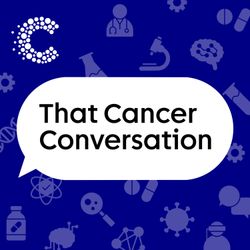
6. Are we looking after our skin?
53:17||Season 3, Ep. 6Welcome to another episode of That Cancer Conversation!We're entering the summer season and hopefully expecting some sunny weather. But with warm weather approaching we're likely to spend more time outdoors, so it’s time to start thinking about protecting ourselves from those UV rays!Skin cancer is the 5th most common cancer in the UK, with almost 9 in 10 cases caused by exposure to too much ultraviolet (UV) radiation from the sun and sunbeds. It's important we take care of our skin and Sophie Brooks, who works in the health information team at Cancer Research UK, joins the podcast to provide some simple and effective tips alongside discussing some common skin cancer and sun safety myths.But we're recently seeing an alarming increase in skin cancer cases and sunbed usage. In 2024, a survey by the charity Melanoma Focus found that 28% of UK adults use sunbeds, and seeing a rise to 43% among 18 to 25 year-olds. Jak, a content creator, also joins the podcast, sharing his personal cancer story being diagnosed with skin cancer at 21 years old and how his use of sunbeds may have played a big role.If you enjoyed the episode, don’t forget to subscribe and watch it all on our YouTube channel!Jak's TikTok: https://www.tiktok.com/@jakk_howArticle --> Skin cancer 101: What everyone should knowCancer News article --> Clothing choices could be linked to melanoma skin cancerFollow us on Instagram to stay updated and for more cancer stories visit Cancer News.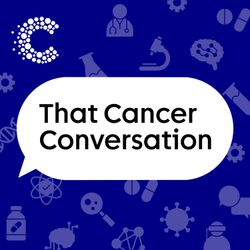
5. Can foods be cancerous?
01:07:07||Season 3, Ep. 5Welcome to another episode of That Cancer Conversation! In this episode Sophie delves into the big topic of food and cancer.She begins the conversation with her first guest, Professor Marc Gunter, a cancer epidemiologist who specialises in diet and obesity and is part of Cancer Grand Challenges team, PROMINENT. He talks all about how food can impact someone’s risk of getting cancer and unpacks some highly talked about foods, such as ultra processed foods, coffee beans and even the trending ‘green powders’.Later in the episode, Cancer Research UK’s health information manager, Dr Rachel Orritt, speaks about misinformation and how sensationalised headlines can often make it to our media and our feeds. She also breaks down some common cancer and diet myths that comes across her desk and what a healthy balanced diet actually means.If you enjoyed the episode, don’t forget to subscribe and watch it all on our YouTube channel! Extra links: Discover more about Cancer Grand Challenges Article --> Are ultra-processed foods linked to cancer?Follow us on Instagram to stay updated and for more cancer stories visit Cancer News.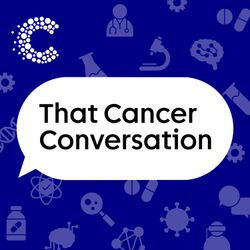
4. Why are more younger adults getting cancer?
56:32||Season 3, Ep. 4Welcome to another episode of That Cancer Conversation! We think of cancer as a primarily elderly disease but there’s a rising trend of cancer cases in younger adults (age 25 to 50), also known as early onset cancer. And in this episode we’re discussing what early onset cancer is and why it’s rising. To start the conversation, Sophie speaks to Dr Nisha Duggan, a former researcher and now science engagement manager at Cancer Research UK, to unpack what cancer is and why early onset cancer might be different. Sophie also speaks to Professor Andrew Chan, a co-lead for one of the Cancer Grand Challenges teams, Team PROSPECT. Cancer Grand Challenges is a global research initiative that identifies the toughest challenges in cancer research, and Andrew and his team aim to answer some of the biggest questions around early onset cancer. He explains not only how they’re trying to understand the rise in cases, but also how they can reverse the trend. If you enjoyed the episode, don’t forget to subscribe and watch it all on our YouTube channel! Extra links: Discover more about Cancer Grand Challenges Article --> E. coli toxin could be linked to rising rates of bowel cancer in younger adults Follow us on Instagram to stay updated and for more cancer stories visit Cancer News.
loading...